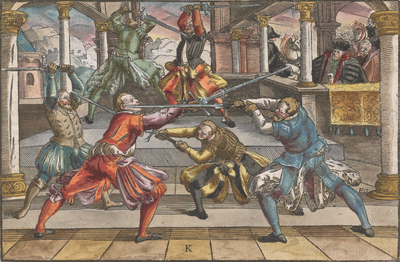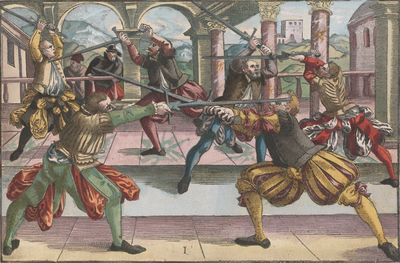|
|
You are not currently logged in. Are you accessing the unsecure (http) portal? Click here to switch to the secure portal. |
Difference between revisions of "Prellhauw"
James Reilly (talk | contribs) |
James Reilly (talk | contribs) |
||
| Line 36: | Line 36: | ||
== Referances== | == Referances== | ||
| − | [[Category:Strikes]][[Category:German Strikes]][[Category: | + | [[Category:Strikes]][[Category:German Strikes]][[Category:German_Strikes_(Meyer)]] |
Latest revision as of 16:24, 14 June 2016
The Prellhauw (Brellhauw, Rebound Hew) is a strike in which in which the flat of the blade is presented which then bounces of the opponents blade to another or the same opening. This strike is one of a number of Joachim Meÿer's named strikes.
Primary Sources
Figures |
1570 Edition
| |
|---|---|---|
Bounce Strike This one is twofold, one the single, the other one named the double. The single is made thus: when your adversary strikes at you from above, meet his strike with a Zwerch, as soon as it connects, twitch the sword around the head, and strike from your left with the outward flat towards his ear, as shown by the large figures on the right hand side of Illustration K, so that the sword bounces back again, thus twitch it during the rebounding swing back around the head again, strike with the Zwerch towards the left, thus it is completed. |
[Ⅰ.13r.3] Prellhauw. DIser ist zweyerley: Einer der Einfach, der ander der Doppel genandt. Der Einfache wirt also gemacht, Hauwet dein gegentheil auff dich von Oben her, so begegne seinem streich mit einer Zwerch, als bald es dan glitzt so zuck das Schwerdt umb deinen Kopff, unnd schlag von deiner Lincken mit außwendiger letzer flech, zu seinem Ohr, aller ding wie das grosser Bild zur Rechten hand in der Figur K. außweißt, das das Schwerdt widerumb zu ruck abprelt, zuck es also im abpreleten schwung wider umb deinen Kopff, Hauw mit der zwerch zur Lincken, so ist er volbracht. | |
Do the double thus: just as your adversary brings his sword in the air to work against you while closing in, place yourself in the right Ochs, twitch your sword around your head, and strike with the inward flat strongly against his blade from your right side so that your pommel touches your forearm during the strike, as it is depicted in the large picture in Illustration I, and can be seen on the left hand side. However, while striking step well around towards his left with your right foot, and as soon as it hits or connects, pull it upwards and wrench out simultaneously towards your left side and nimbly strike from the outside with inverted hands again towards the same opening, that is with the inverted flat when it strongly rebounds in a ricochet motion, thus you have done it right. |
[Ⅰ.13r.4] Den Doppeln mach also, als bald im zufechten dein widerpart sein Schwerdt in die lufft bringt zur arbeit, so stell dich in den Rechten Ochsen (davon im nechsten Capitel) zucke das Schwerdt umb dein Haubt, unnd Hauw mit inwendiger flech von deiner Rechten starck wider seine klinge, das dir dein Knopff im schlag unden an die spindel rühre, wie solchs an dem grossern Bild in der Figur I. verzeichnet, gegen der Lincken handt zusehen, im streich aber trit mit deinem rechten fuß wol umb seinen Lincke, und so bald es glützt oder rühret, so ruck es ubersich, reiß in des gegen der Lincken seiten gleich mit auß, und schlage behend außwendig mit ebichter handt wider [Ⅰ.14r.1] umb zu der selben Blöß hinein, nemlich mit letzer oder ebichter fleche, als wann es sich in einem widerprell also herte umbprelt, so hastu !hn[!] recht gemacht. |
Video Interpretations
{{#evp:youtube|6B6HkmzN1U|Björn Rüther|left}}
{{#evp:youtube|b6V1nrnU4wU|Helenic Academy of Historical European Martial Arts|left}}
{{#evp:youtube|pkJEoBsALY8|Scholars of Alcala|left}}


